Part 1 of 2 Parts
NANO Nuclear Energy Inc. is an emerging microreactor and advanced nuclear technology company led by a world-class nuclear engineering team. They are developing proprietary, portable and clean nuclear energy solutions for the United Kingdom and global market. NANO Nuclear recently announced that it has become a Corporate Affiliate and member of the Nuclear Institute. The Nuclear Institute is a professional membership body dedicated to the nuclear industry in the U.K.
NANO Nuclear continues to expand its connections withing the global nuclear energy industry. These connections have and are expected to continue to support NANO Nuclear technical and business development activities.
Several key figures of NANO Nuclear’s management and technical team will attend the Nuclear Institute and the Nuclear Industry Association Annual Dinner. The attending members include Founder and Executive Chairman Jay Jiang Yu, Lead of Nuclear Reactor Engineering Eugene Shwageraus, Ph.D., and Lead of Nuclear Fuel Cycle, Radiation and Materials Ian Farnan, Ph.D.
The Annual Dinner is the premier event for the nuclear industry in the U.K. It will bring together key players from across the nuclear industry in the U.K., from academia, government, legal, commerce, and across the sector. The dinner is co-hosted by the Nuclear Institute and the Nuclear Industry Association and will be held in the Grosvenor House Hotel in London, England on December 7th, 2023.
Jay Jiang Yu is a Founder, and the Executive Chairman of NANO Nuclear. He said, “Our company is dedicated to bringing portable, nuclear microreactors to the marketplace within a decade both in the U.S. and ultimately worldwide. The timing of our joining the prestigious Nuclear Institute in the U.K. is perfect as we learn of breaking news from the 2023 United Nations Climate Change Conference in Dubai (COP 28) that more than 20 countries from four continents (including the United Kingdom) launched the Declaration to Triple Nuclear Energy by 2050. The United Kingdom, with its rich history in nuclear energy, is also looking to the future and is actively upgrading its nuclear infrastructure with advanced technologies. Our association with the Nuclear Institute presents an invaluable opportunity to leverage these synergies to gain insights and expertise from a nation that is also a leader in nuclear energy innovation.”
Dr. Ian Farnan is the Lead of Nuclear Fuel Cycle, Radiation and Materials of NANO Nuclear. He said, “The Nuclear Institute is a well-recognized entity within our industry. The organization has made significant contributions to maintain the United Kingdom’s leading position in nuclear technology. We are delighted to become an official member and to participate in the upcoming Annual Dinner.”
The Nuclear Institute’s U.K. network provides a place for the nuclear industry community through events, its branch network, special interest groups and many volunteer-led activity. The Nuclear Institute represents over three thousand five hundred professionals at all levels across the U.K. nuclear industry, from new builds and operations to decommissioning. It also maintains the Nuclear Delta which is the independently defined standard for nuclear professionalism.
Please read Part 2 next







